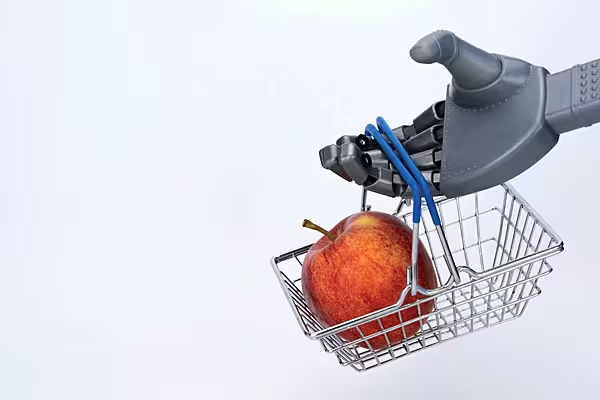Generative AI has the potential to be a game-changer for the retail sector. ESM caught up with Professor Peter Gentsch, founder of Retail.ai, and Thorsten de Boer, senior partner at Roland Berger, to discuss the technology’s potential. This article first appeared in ESM's September/October 2024 edition.
Generative AI is set to play a key role in improving efficiency, reducing costs, and optimising product development and marketing in the retail and FMCG sector, provided that businesses can see beyond its immediate benefits. That’s according to Retail.ai (www.retailai.io), a subsidiary of Markant AG, which was developed to empower retailers and consumer goods firms alike to make optimal use of generative AI.
The Retail.ai operating model is built around four key pillars: developing tailored Gen AI solutions; an academy to upskill and reskill businesses; a lab dedicated to industry-specific AI research; and the Retail.ai ‘alliance’, a knowledge hub and forum wherein practitioners and users can collaborate and share their learnings.
It was established in March of this year, as a first-of-its-kind ‘Gen AI as a service’ model, to enable small- to medium-sized firms to take advantage of the capabilities of generative AI and support the development of best-practice models and strategies that benefit everyone, not only the giants of the industry.
In addition – as Professor Peter Gentsch, one of the founders of Retail.ai, put it earlier this year – the platform will facilitate the migration from “ChatGPT to ActGPT” – in other words, enable the development of solutions that can play a key role in processes essential to day-to-day functioning.
A Pivotal Moment
What does this mean in practical terms? ESM interviewed both Gentsch and Thorsten de Boer, a senior partner at Roland Berger’s consumer goods and retail team, to uncover whether or not the emergence of Gen AI represents a pivotal moment in retail and if early adopters stand to gain significant advantages.
“I definitely think Gen AI will be a game-changer for retailers,” Gentsch explains. “Retailers who don’t adopt Gen AI are likely to fall behind, but, in my experience, most retailers are still in the phase of exploring, running pilots, and experimenting. Moving to the next phase – scaling up, transitioning from a lab environment to a factory setting, and establishing a truly at-scale, reliable process – is really challenging.”
To accompany the launch of Retail.ai earlier this year, Gentsch published a white paper, Generative KI in Handel & FMCG 2024, which explored the business case for greater investment in Gen AI on the part of retailers. It indicated a mixed response to the technology in Germany, where around a third of retailers (32.2%) have adopted some degree of generative AI in their operating structures, while around the same percentage assign a ‘low’ or ‘very low’ degree of importance to AI projects.
In the US, meanwhile, appreciation of the benefits of Gen AI was higher, with 59% of retailers saying that they planned to use the technology to optimise customer service, 49% for category management and marketing, and 44% to support their creative teams.
“You can apply Gen AI across the whole supply chain, marketing, sales – every channel can benefit from it,” says Gentsch. “That’s what’s new about it. Rather than just analysing and predicting data, now you have a tool that becomes a production and innovation factor. It generates content, it creates things.
“So, again, I believe it’s going to be a big game-changer, but if you ask me about the current state of Gen AI, I would say there’s still room for improvement. There’s a huge window of opportunity, but there are also many challenges that make it difficult to fully unleash the potential of this technology.”
The report lists a number of specific areas in which Gen AI offers significant potential: supplier communication and management, procurement, category management and assortment architecture, in-store optimisation, supply chain management, personalisation, customer service, loyalty – the list goes on.
All told, it could generate between $440 billion and $600 billion of additional FMCG revenue annually, assuming that existing AI systems are replaced or enhanced by Gen AI technologies.
Automation, Augmentation And Innovation
Realising that potential, however, requires moving away from what might be called ‘tier one’ thinking – in other words, considering Gen AI as a simple automation tool that can streamline tasks such as generating product descriptions at scale, for example.
“With Gen AI, you can produce content descriptions at scale, and do it with very high accuracy, optimise for Google, take into account seasonal effects, and so on,” says Gentsch. “If you ask an agency to do it, they might have a set fee per product description, but now, using GPT, it costs you one cent. So, it’s a very easy business case. You can save money. You can increase efficiency, but Gen AI really goes far beyond that.”
The second tier of Gen AI integration is what Gentsch describes as ‘augmentation’ – using Gen AI as a supportive tool, such as a ‘digital co-pilot’ for category managers.
“Let’s say your revenue in a particular category isn’t meeting your expectations,” says Gentsch. “Every retailer has a toolkit on how to improve it – they might run more promotions, they might reconfigure the category, and so on – but to do this, every category manager has to go through all the competitive data, all the promotional data, all the category management data. This is something that can be done by Gen AI.”
A further tier of Gen AI capability relates to ‘innovation’ – harnessing its potential to drive innovation by generating new-product ideas and concepts. As Gentsch points out, Coca‑Cola’s limited-edition Zero Sugar Y3000, launched last year, was also derived from Gen AI pondering the question, ‘How will we drink Coca-Cola in the year 3000?’
Unfortunately, many in the industry remain in the starting blocks.
As Gentsch notes, “I would say 80% of the projects the industry is running are just automation, maybe 15% augmentation, and just 5% are even thinking about how to use Gen AI for innovation.”
This lethargy, in turn, reinforces the fear that many in business have about Gen AI. “When business leaders discuss these topics, everyone tends to focus on automation,” adds de Boer. “This focus on automation often leads to concerns about reducing employees, so no one wants to push it forward, but we need to shift our thinking towards augmentation and innovation – this approach would make it easier to develop these topics.”
Mindset Shift
Gentsch has been working in the field of artificial intelligence since the 1990s – “We faced two major problems: the lack of data, and insufficient computing power,” he says – and believes that the impact and accessibility of Gen AI has evolved to a level where there is a workforce eager to explore its possibilities, provided that the infrastructure is there to allow it to do so.
“When it comes to data and analytics, retailers have never been among the front-runners,” he says. “They’ve always struggled with it, and now they have to adapt to Gen AI. That requires a different infrastructure, and the need to upskill and reskill your organisation.
“If you do that, however, you will find you have plenty of young talent eager to engage. Start with it as a ‘playground’ – demystify the technology, and let them play around to see the benefits. It’s not rocket science. With Gen AI, it’s never been as easy as today to run a pilot and experiment. Rossmann and dm, the German drugstore retailers, are good examples of this. They encourage people to experiment with new technology, but don’t get me wrong – transitioning from the playground to full-scale implementation isn’t easy.”
A mindset shift may also be required on a corporate level. Gen AI has the capability to unlock significant strategic benefits where data is shared, however, this is not a trait common to many retailers. Gentsch admits that when he began working on this project three years ago, he was struck by the vast amounts of data available, primarily used for transactional purposes, and sought to leverage this data to enhance customer experiences and uncover hidden value.
However, this came up against retailers’ reluctance to share data – a common issue in retail, compared to other sectors, like automotive or pharmaceuticals, where data-sharing is more prevalent.
“I would say it’s kind of a wait-and-see mindset,” says Gentsch. “I think it’s an intrinsic part of this industry. When talking to executives, they often say, ‘As far as I understand, nothing is certain, so we’ll wait until everything is clearer.’ They acknowledge the potential, but prefer to see how others use it before diving in themselves.”
While the Retail.ai model is built around democratisation, another hurdle that the business has discovered is a demand for exclusivity, particularly on the part of larger operators with the financial muscle to influence the marketplace.
“One negative aspect of democratisation is that many players in the market demand exclusivity,” says de Boer. “For instance, if Retail.ai develops a product or tool for one of the big players, they often request exclusivity. This can prevent the tool from being rolled out or made easily accessible to smaller retailers.”
Quick Wins And Points Of Friction
In closing, ESM was eager to discover where both Gentsch and de Boer see the ‘quick wins’ for retailers when it comes to Gen AI, and the potential hurdles.
According to de Boer, category management and customer communication, particularly through loyalty programmes, are among the most promising areas for immediate benefits. At the same time, however, the thin margins on which many retailers operate, coupled with their reluctance to invest in new technologies, pose significant obstacles.
“However, I am seeing, more and more, that everyone is starting to experiment with these new technologies, which is promising for the future, from my perspective,” he explains.
For Gentsch, the answer is simple: ask the technology, “We utilised Gen AI to create a tool where you type in your objective – whether you want to reduce costs or increase customer satisfaction, for example – and the tool translates that into use cases and metrics, such as the ability to execute, and business impact. This allows you to see, for the retailer, what the low-hanging fruit is: which use cases have a significant business impact and a high probability of success – in other words, using Gen AI to figure out the potential of Gen AI itself, which is amusing.”
In terms of obstacles, the uncertainty related to compliance, data skills, and the question of ‘what’s in it for me’ are hurdles that the industry will need to overcome before Gen AI achieves widespread adoption.
“It’s not a single obstacle, but a general uncertainty. As you know, there’s a saying that ‘we overestimate technology in the short term and underestimate it in the long term.’ I think this applies exactly to AI in the retail sector.”













